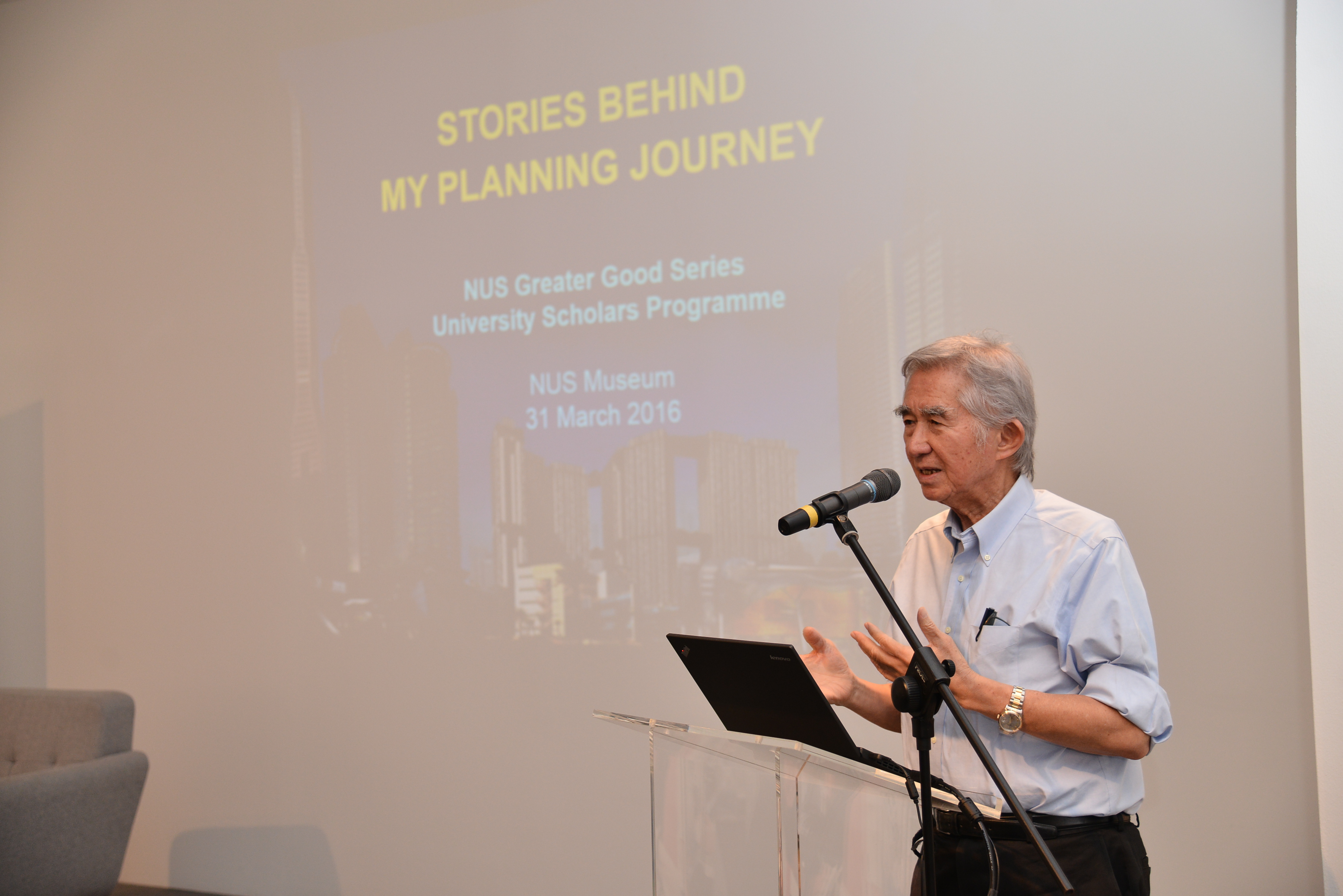
Dr Liu Thai Ker speaking at the NUS Museum (right)
The father of city planning Dr Liu Thai Ker attributes his success to a well-rounded education and shares insights into the thinking behind urban Singapore, and how the NUS University Scholars Programme (USP) will help nurture future leaders.
Singapore did not happen by accident.
It did not become the greenest city in Asia just because more space was allocated for planting trees.
Architecture alone is not enough.
A well-rounded education is key to success.
These statements made by Dr Liu Thai Ker at the National University of Singapore (NUS) Greater Good Series event titled “Humanist’s Heart, Scientist’s Mind and Artist’s Eyes – Stories behind my Planning Journey”, only reveal a fragment of the vast amount of thinking and analysis that went into planning a near perfect city like Singapore.
“To be a good urban planner, you need to have a humanist’s heart for the people and the land, a scientist’s head for designing a perfect machine for living, and an artist’s eyes for romancing the land. It’s like being a symphony conductor; all elements must come into place,” reflected the Adjunct Professor at the NUS Lee Kuan Yew School of Public Policy, and Senior Director of RSP Architects Planners & Engineers (Pte) Ltd.
Trained as an architect, the former Chief Executive Officer (CEO) of the Housing and Development Board was credited with the successful implementation of public housing in Singapore in the 70s and 80s, to which he applied the principle of ‘good housing before good architecture’, putting more emphasis on environment, affordability and social factors.
By turning problems such as squatters, limited land and lack of resources into opportunities, a lot of major issues were addressed, and by 1985, there were no homeless people in Singapore, industrial estates were built, and a good transport system had been established.
The city went on to claim many accolades, ranking well internationally in areas such as quality of life, greenest city and most business-friendly country.
“Singapore turned out to be my urban laboratory and I learned a lot on the job. This is something that I am happy with and at the same time grateful for,” says Dr Liu.
To Dr Liu, growing up in a creative environment (his father was pioneering Singapore artist Mr Liu Kang and his uncle practises Chinese calligraphy) impacted the way he shaped urban landscapes. While urban progress is important, he took pains to retain its natural environment, soul and heritage. When Dr Liu took the role of CEO and Chief Planner at the Urban Redevelopment Authority, he put conservation policies and practices in place. The respected painter also served as the Chairman of the National Arts Council for nine years, contributing significantly to the development of the arts scene in Singapore.
Having benefitted from a holistic education, Dr Liu credits the University Scholars Programme with creating a nurturing environment that combines an in-depth cross-disciplinary curriculum with overseas and community programmes that lead to engagement with global and social issues.
Associate Professor Kang Hway Chuan, Director of USP and Chair of this event, also underscored the importance of a well-rounded education provided by USP, which offers students the freedom to explore across disciplines outside of their home faculty, and also the benefit of informal interactions in a residential college setting. He hoped that more will support this dynamic educational experience and allow the University to develop more leaders of the future.
“It is essential to train the next generation to think, imagine and be curious,” Dr Liu adds.
The NUS Greater Good Series features talks by leading minds on topics related to philanthropy. These include generosity, giving and service to the community, as well as leadership, personal well-being and mental resilience. The Series aims to raise awareness of philanthropy and its impact on society. The Series was made possible thanks to a generous gift from Newsman Realty Pte Ltd.
For further information on the NUS Greater Good Series, contact the Events team at dvoevents@nus.edu.sg.






